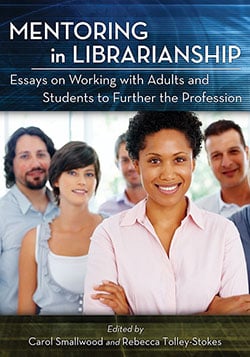Mentoring in Librarianship
Essays on Working with Adults and Students to Further the Profession
$55.00
In stock
About the Book
Both new librarians and those changing directions in the field can benefit greatly from a relationship with a positive and supportive mentor. In this book, public, school, academic, and special librarians, as well as LIS faculty and consultants, offer expertise and wisdom for those wishing to become a mentor or a protégé or to implement a mentoring program. Topics include reasons for choosing mentoring relationships, practical tips on setting up a program, internships, practicums, job shadowing, virtual reference, opportunities for those new to the profession and those in mid-career, and mentoring across disciplines. By sharing their personal successes as well as their failures in mentoring, the 35 contributors offer sound advice backed by years of experience, advice that will aid all librarians who seek guidance or want to guide the future of the library profession.
About the Author(s)
Bibliographic Details
Edited by Carol Smallwood and Rebecca Tolley-Stokes
Format: softcover (7 x 10)
Pages: 230
Bibliographic Info: bibliographies, index
Copyright Date: 2012
pISBN: 978-0-7864-6378-7
eISBN: 978-0-7864-8870-4
Imprint: McFarland
Table of Contents
Preface 1
Part I: Philosophical Questions and Practical Applications
1. Creating a Mentoring Community in an Undergraduate Library
Michelle Twait, Jeff A. Jenson, and Anna J. Hulseberg 3
2. Creating Good Karma through Mentoring and Passing It On
Christina Stoll 13
3. Developing Criteria and Goals for a Mentoring Program
Allison T. Coltin 21
4. The Importance of Structured Time Between Mentors and Mentees
Jamal L. Cromity 28
5. Mentoring from the Perspective of Mentees
Nicole Pasini 34
6. Learning Outcomes and Cultural Context of Mentoring
Danielle M. Colbert-Lewis 41
7. Mentoring with Leaders: Tips
Vandella Brown 47
8. “Serendipitous Mentoring” in Small College Libraries
Kyle M.L. Jones and Jacob Hill 54
9. Steps Involved in Being a Mentor
Myrtis Cochran 62
Part II: Mentoring Students
10. Begin at the Beginning: Mentoring Student Employees in the Archives
Morgan R. Davis 69
11. Making a Connection: Mentoring High School Students in Special Collections
Keith Phelan Gorman 75
12. Mentoring on the Fly: Seizing Moments
Pat Duck 83
13. Mentoring Undergraduate Students: Examples, Steps, and Collaborative Campus Efforts
Wen-ying Lu 88
14. My One Room Schoolhouse: Mentoring in a Diverse Classroom
Stacy Russo 98
15. Putting Interest Where the Work Is: Mentoring Students through Library Digital Production Activities
Bradley J. Daigle 105
Part III: Mentoring Students in Library School
16. Creating a Structured Program to Help Staff Earn Their MLIS
Matthew Pacer 113
17. Mentoring MLIS Students in Collaborative Virtual Reference: The AskColorado Program
Kris Johnson 120
18. Mentoring MLIS Graduate Students
Jodee L. Kawasaki 129
19. Early Career Librarians Helping LIS Students and Recent Graduates
Lisa Campbell 134
20. Librarians as Mentors for Adults and Students
Mary Jo McKeon 140
21. Beyond the Classroom: Mentoring MSLIS Students in an Academic Library
Katy Kelly 145
22. The Job Search: Application to Negotiation
Jennifer O’Brien Roper 151
Part IV: Mentoring Librarians
23. The Art of Mentoring Across Disciplines
Thomas Caswell 163
24. Betwixt and Between: The Junior Academic Librarian as Mentor
Norda Majekodunmi 169
25. Mentoring the Library Assistant in an Independent School Library
Janet L. Silvano 176
26. Mentoring at a Distance
Aline Soules 183
27. Mentoring a New Distance Education Librarian
Annie Knight 191
28. Mentoring Librarians One-on-One as an Experienced Cataloger
Ruth Elder 199
29. Trickle Down Teaching: Encouraging Collaborative Teaching by Using a Peer Model of Mentoring New Instruction Librarians
Martinique M. Haller 206
About the ContributorsS 213
Index 219
Book Reviews & Awards
“a valuable resource…strengthens the case for mentoring systems to be much more widely established as a normal and formal feature of our professional life”—The Australian Library Journal; “Mentoring offers a roadmap for experienced librarians to pass on their knowledge to students and early career librarians who are ‘still in growth mode.’ This book is especially timely in light of the number of experienced librarians who will retire and exit the profession in the next few years as it offers concrete guidelines to continue the chain of knowledge.”—Lois Stickell, Research Services Librarian University of North Carolina at Charlotte; “Mentoring in Librarianship provides innovative, timely, and practical tips on implementing mentor/mentee relationships in all types of libraries. This book provides a fresh perspective on what it means to be a mentor in today’s libraries.”–Erin Davis, Assistant Librarian, Utah State University; “This anthology is a valuable resource for those considering entering into a mentoring relationship. These articles provide insight into what is expected from both mentor and mentee and how to structure a mentorship based on the needs of both parties.”—Heather Zabriskie, Youth Programs Coordinator, Orange County Library System, Orlando, Florida; “This book will be an important resource for both new and experienced librarians in any stage of their careers.”—Allan Cho, University of British Columbia Library. “Mentoring in Librarianship is an excellent collection of what works on all aspects of mentoring.”—Regina Koury, Electronic Resources Librarian, Idaho State University; “This anthology contains a wealth of information and is the perfect mentor for how to go about mentoring!”—Lisa L. Crane, Western American Librarian, Claremont Colleges Library; “Mentoring in Librarianship is a great resource for all types of librarians or libraries developing a mentoring program. Those new to the profession or those thinking of creating a mentoring program will find easy plans with ideas of what works and what doesn’t to save you time.”—Victoria Lynn Packard, Coordinator of Instructional Services & Distance Learning, Texas A&M University–Kingsville; “The authors give a cohesive view of mentoring that understands and promotes this artful practice as a way to communicate the enduring values and core competencies to emerging talent.”—James Lund, Director, Red Wing Public Library, Red Wing, Minnesota; “All-in-one guide to the concept of mentoring for library professionals, this book outlines not just practical considerations but philosophies and meditations for librarians in mentoring positions. If you’re interested in being a steward, mentor, guide or friend to someone considering a career in librarianship, this collection of essays from academic and special librarians will give you plenty of angles to consider and stories to take to heart.”–Jessamyn West, author, Without a Net: Librarians Bridging the Digital Divide.






